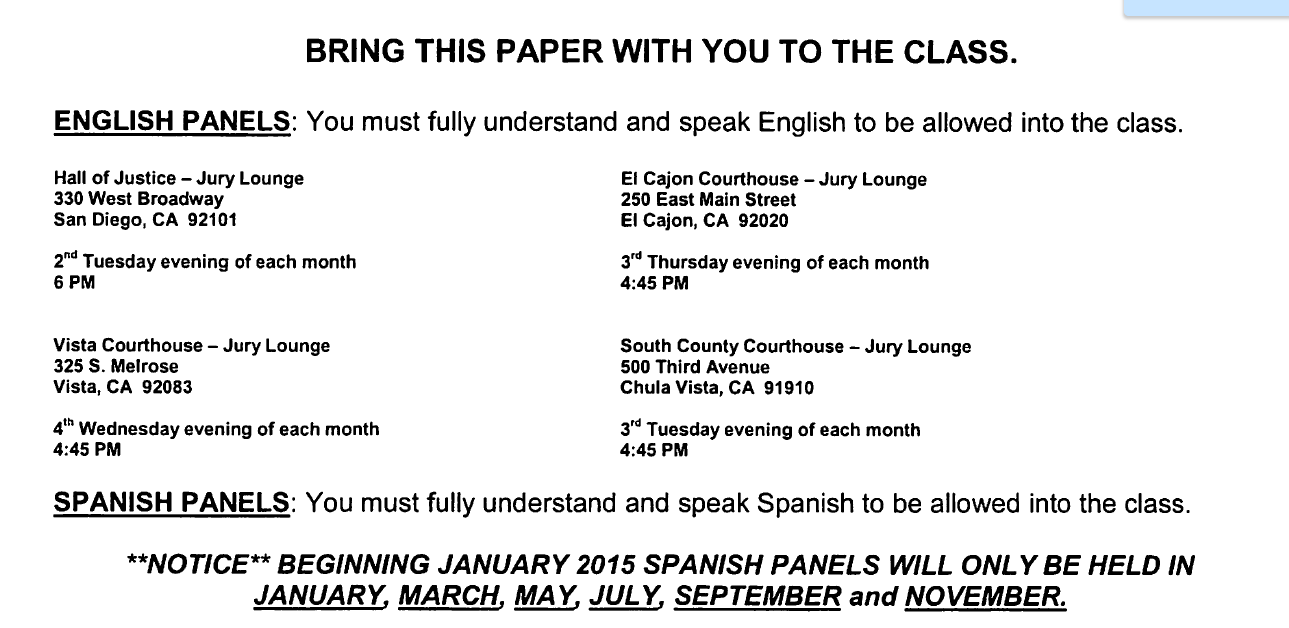San Diego MADD Victim Impact Panel

If you are sentenced to a San Diego DUI or a related charge, one of your terms will likely be to attend a MADD victim impact panel. The panel lasts for about one hour, and typically consists of members of our community who speak about how drunk driving has affected their lives. The MADD panel speaks to a very large group of people in what can be emotional stories about San Diego DUIs. I, attorney Mark Deniz, have attended several of these meetings.
The fee is typically $20. You must sign in when you arrive. You must bring a photo ID, your case number and the date by which you must complete the MADD panel. You can bring a visitor with you only if there is enough seating space.
This term of a San Diego DUI charge is looked upon very seriously, and it is important to attend this meeting as soon as possible if it is a condition of a probation term of a San Diego DUI.
Click here to see the local San Diego MADD Panel schedule.
MADD affiliates select a panel of two or three victims to speak about an impaired driving crash that drastically affected their lives — either they were injured in the crash or a loved one was injured or killed. They are not there to blame or judge those in attendance. Speakers simply inform attendees of how a crash has affected their lives and families. Victims and offenders do not interact during the panel, but attendees are invited to talk with the speakers after the program.
Individuals convicted of DUI are often required to attend a Victim Impact Panel as part of their sentences. The panel adds a relevant, thought-provoking component. After the sentence is pronounced, the offender is informed of the various dates, times and locations of the panels. Attendance is reported to the courts for proof of compliance. Warrants will be issued for those offenders who fail to attend the panel, and they must return to court for appropriate sanction. NO ONE will be admitted if they are impaired by ANY amount of alcohol or other drugs.
For additional details call the Victim Impact Panel information line at 858-564-0785.
MADD San Diego County
858-564-0780
See more
Founded by a mother whose daughter was killed by a drunk driver, Mothers Against Drunk Driving (MADD) is the nation’s largest nonprofit working to protect families from drunk driving and underage drinking. MADD also supports drunk and drugged driving victims and survivors at no charge, serving one person every 8.6 minutes through local MADD victim advocates and at 1-877-MADD-HELP.
Mothers Against Drunk Driving, or MADD, is a powerful political activist group that makes an impactful and concerted effort to raise awareness about drunk driving, establish and enforce increasingly stricter California DUI laws and sanctions, and raise funds to support and promote their cause – reduction of intoxicated driving induced injuries and fatalities. MADD recently celebrated its 25th anniversary and is backed by large corporate sponsors such as State Farm, Nationwide Insurance, Volkswagen, Nissan, Toyota, Ford Motor and various other international organizations. One current and well-publicized MADD campaign is titled “Eliminate Drunk Driving”, yet another is named “Drunk Driving: Over the Limit, Under Arrest”.
What Is A Victim Impact Panel?
An Impact Panel typically consists of a group of three or four victims who deliver a firsthand monological account recalling the injury and trauma inflicted upon them by an impaired or intoxicated driver, or the suffrance and effects of losing a beloved relative or friend due to drunk driving.
Panels are moderated by a VIP coordinator who manages the program schedule, timing, introductions, etc. DUI offenders have no interaction or dialogue with the panel victims during the proceeding, but usually have an opportunity after the presentation to converse with the speakers and other members of MADD, if they choose.
Court-Ordered Attendance
In San Diego County, victim impact panel attendance is usually available only to first-time DUI offenders. In some cases, the hours spent attending an impact panel can be credited as time served or applied toward community service fulfillment, depending on the sentencing terms outlined by the court.
Court-mandated attendance is typically ordered by the presiding judge in a DUI case, but sometimes at the direction of a probation officer or military base commander, as well. Once sentenced, the defendant will be prescheduled by the court or other authority as to when and where to attend the Victim Panel presentation and notified of the predetermined location, date, and time both verbally and in writing. At the conclusion of the delivery, MADD representatives issue compliance letters to court-ordered attendees. Absentees and no-shows must return to the presiding court for alternative sanctions, or sentencing.
If you fail to complete conditions of your DWI sentence or probation, including VIP attendance, a warrant will be issued for your arrest. Any attendee under the influence of alcohol or drugs will be asked to leave.
NHTSA & MADD
The National Highway Traffic Safety Administration works closely with MADD at the federal level and supports the Victim Impact Panel (VIP) Program as a supplemental measure to assist in the deterrence of DUI recidivism, rather than as a substitute for incarceration, driver’s license suspension and revocation, fines or other consequential penalties of a DWI conviction.
The DUI accident victims, or those who have lost loved ones in fatal accidents, who constitute each panel’s group do not take a blaming or prejudicial stance against drunk driving, but rather an educational approach to raise awareness about the dangers and potential consequences of DWI.
In a published online document pertaining to Victim Impact Panels, NHTSA states we have yet to see a decrease in recidivism in the U.S. Panels help the victims and bereaved heal, and hope to humanize the participants’ experiences and views for a thought-provoking and preventative determent to second and subsequent DUI offenses.

